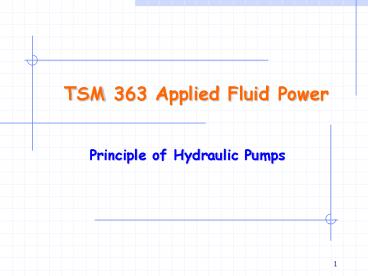TSM 363 Applied Fluid Power - PowerPoint PPT Presentation
1 / 20
Title:
TSM 363 Applied Fluid Power
Description:
Principle of Hydraulic Pumps Goals of this Lecture It s Powerful, What Provides the Power? Energy Flow in a Fluid Power System Positive Displacement Pumping Key ... – PowerPoint PPT presentation
Number of Views:156
Avg rating:3.0/5.0
Title: TSM 363 Applied Fluid Power
1
TSM 363 Applied Fluid Power
- Principle of Hydraulic Pumps
2
Goals of this Lecture
- Basics of hydraulic pump
- Principle of Positive displacement pumping
- Key parameters
- Principles of typical hydraulic pumps
- Gear pumps
- Vane pumps
- Piston pumps
3
Its Powerful, What Provides the Power?
4
Energy Flow in a Fluid Power System
5
Positive Displacement Pumping
6
Key Hydraulic Pump Parameters
- Rated discharge pressure the maximum continuous
operating pressure of a pump under normal
operating condition - maximum discharge pressure
- minimum discharge pressure (or margin pressure)
- maximum inlet pressure
- Rated speed the speed at which the pump can
continuously operate to discharge flow at the
rated pressure - maximum speed
- minimum speed
7
Pressure Rating of the Pump
Pressure rating is the maximum pressure that
should be encountered at the pump discharge port.
Pressure is determined by Load!
8
Power Output from a Hydraulic Pump
In a hydraulic displacement pump, the power
output is determined by the setting pressure and
the actual output flow rate, and the pump
efficiency using the equation below
9
Delivery Capacity of a Pump
In practice, the pump is rated in terms of how
much fluid is supplied per unit of time, and
expressed in terms of Gallons per minutes
(GPM) liters per minutes (L/min)
k Unit conversion constant
10
Example Determination of Pump Capacity
From the catalog of a hydraulic pump
manufacturer, we can find the following
information Pump Delivery _at_ 1000 RPM 0.641
in3/rev. Please try to determine the pump
capacity
Q Dn/K
11
Commonly Used Hydraulic Pumps
- Vane Pumps
- Unbalanced vane pump
- Balanced vane pump
- Gear Pumps
- External gear pump
- Internal gear pump
- Piston Pumps
- Radial piston pump
- Axial piston pump
12
Vane Pumps
- Construction with a round cam ring
- Low cost
- Limited pressure capability
- Unbalanced hydraulic loading (side-loading)
- Popular with fixed displacement pumps
- Prevents side-loading
- Limited pressure range
- Relatively more expensive
13
Gear Pumps
- Fixed displacement only
- High pressure capability
- Unbalanced
- Available as single, multiple or through drive
version
- One external gear and one internal gear
- fixed displacement only
- Unbalanced
- More compacted in size
14
Piston Pumps
- Pistons arranged radially in a cylinder block
- High efficient
- medium-high pressure range
- Rotating cylinder block (centrifugal force)
- Pistons parallel to axis of the cylinder block
- High efficient
- medium-high pressure range
- Compacted size
15
Operation Principle of Piston Pumps
16
Needs for Variable-Displacement Pump
Fixed displacement pumps discharge a set volume
of fluid regardless of the system requirement. An
amount of excess will generate heat to the
system.
17
Power Wasted in a Fixed-Displacement Pump
Pump displacement
Corner horsepower
Pump output flow
Metering point
Wasted Power
Relief setting
Useable Power
Operating pressure
18
Operation of Variable Displacement
19
Key Feature of a V-Displacement Pump
- Fixed Displacement Pump
- A fixed volume of fluids will be provided in each
revolution
20
Lecture Summary
- Discussed a few basic theoretical equations, and
their applications in hydraulic systems - Principle of Positive displacement pumping
- Key parameters of hydraulic pumps
- Common types of hydraulic pumps
- The need for variable displacement pumps































